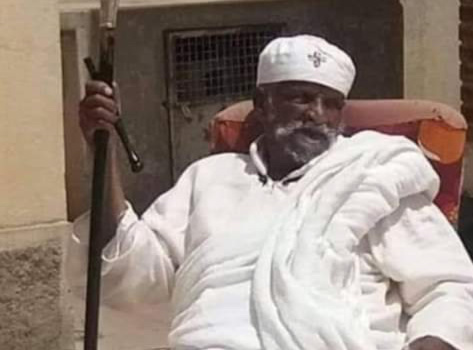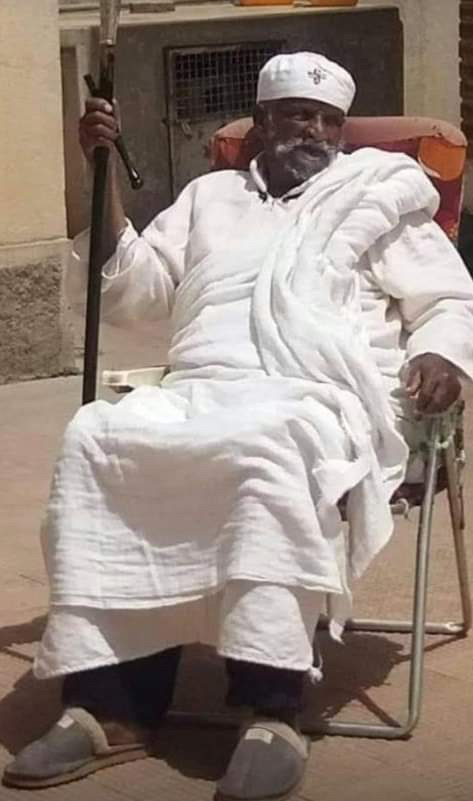
ELLIS HEASLEY and Dr KHATAZA GONDWE, of UK-based religious freedom advocacy CSW, reflect on the life of Eritrean Patriarch Abune Antonios and why honouring his “unwavering stand for human rights and freedom of religion or belief” means calling out ongoing abuses…
In the early hours of 9th February, Abune Antonios, the legitimate patriarch of the Eritrean Orthodox Tewahedo Church, passed away at the age of 94.
He was buried the next day at the Abune Andreas monastery, to which he had belonged since the age of five, in front of a large crowd which had gathered to mark the laying to rest of a courageous and deeply principled leader whose passing represents a stark reminder of the injustices of the Eritrean regime.

Eritrean Patriarch Abune Antonios in an undated photo. PICTURE: Courtesy of CSW.
“We can, and must, take much inspiration from the Patriarch’s courageous commitment to truth and justice.”
Despite having been appointed in April, 2004, Abune Antonios spent the significant majority of his patriarchship under house arrest after he was removed from administrative control of the Patriarchate in August, 2005, and eventually deposed in January, 2006. He remained under de facto arrest in his official residence until May, 2007, upon which his personal pontifical insignia and clothing were seized, and he was officially placed under house arrest in an undisclosed location in the Eritrean capital, Asmara.
The Patriarch’s removal from office, organised in contravention of church canon, was a direct result of his resistance to the Eritrean Government’s repeated interference in church affairs. Specifically, he had refused to expel 3000 members of the Orthodox renewal movement known as Medhane Alem, and had protested the November, 2004, detention of three priests from said movement, who he had earlier refused to remove from their posts. He had also objected to the imposition of Yoftahe Demitros, a pro-government lay person, as the Orthodox general secretary, a position reserved for clergy.
It is unsurprising that the Eritrean regime reacted with such hostility to his efforts. In 1994 it had closed down the official Orthodox and Evangelical Lutheran publications. It had also appointed a Sunni Mufti arbitrarily. In May, 2002, it effectively outlawed religious practices not affiliated with the Catholic, Evangelical Lutheran or Orthodox Christian denominations, or Sunni Islam, and had maintained an intense level of control over the religious affairs of even these groups ever since.
Those belonging to non-recognised groups have suffered since that time, with thousands of adherents believed to have been detained indefinitely without charge or trial, and often cyclically, since 2002. They are generally held in inhumane and life-threatening conditions, where they may experience torture or even death.
It is often difficult to ascertain the full extent of the violations being perpetrated against the Eritrean people. In Patriarch Antonios’ case, he spent much of the past 15 years obscured from public view entirely, with the exception of a tightly-managed appearance at St Mary’s Orthodox Cathedral in Asmara in July, 2017, that was a false display of church unity. However, he was returned to detention, this time in the servants’ quarters of two pro-government bishops, after insisting on the public revocation of the accusations levelled against him as assurance of genuine reconciliation, and his conditions of house arrest, which had been somewhat eased, once again became more stringent.
Patriarch Antonios was initially illegally replaced by Bishop Dioscoros of Mendefera in 2007, a clergyman approved of by the Eritrean Government, but who remained unrecognised by the Orthodox papacy in Egypt until his death following a long and debilitating illness in 2015. Later, in July, 2019, following the leak of a video in which he criticised the reasons for his detention, he was effectively excommunicated after five pro-government bishops signed a statement accusing him of having committed heresy. Weeks later the government announced the election of his second illegal replacement, and unconfirmed reports emerged for the second time since 2017 that he was being forcibly injected with an unknown substance that was impacting his health detrimentally.
We rely on our readers to fund Sight's work - become a financial supporter today!
For more information, head to our Subscriber's page.
Throughout all of this, the Patriarch remained defiantly critical of the Eritrean regime, primarily through videos and statements smuggled out of the country.
In one particularly powerful rebuke dated September, 2008, he wrote: “Even if, in the very unlikely event, you were able to raise legitimate grievances against me, is it not proper for the accused to face his accusers, be presented with the accusations in a formal and properly constituted church tribunal, and the accused given the right to defend himself? Instead, you have appointed yourselves – the very accusers – jury and judges in order to accomplish your sordid plans. Your accusations are all baseless. For this illegal act of yours, the first in the long history of our apostolic faith and tradition, therefore, the Canon and the Constitution of our church will judge you.”
We can, and must, take much inspiration from the Patriarch’s courageous commitment to truth and justice. Today, there are thousands like him who remain imprisoned in Eritrea, often simply on account of their conscience religion or belief. They are held captive by a regime that stands accused of committing crimes against humanity since 1991, and is now also believed responsible for similarly egregious violations in the neighbouring Tigray region of Ethiopia.
We must honour Patriarch Antonios’ unwavering stand for human rights and freedom of religion or belief in particular by continuing to call out the regime’s atrocities, advocating for the release of thousands of prisoners of conscience, and urging parliamentarians in our own countries to hold Eritrea to account on the international stage, including at the International Criminal Court.
Ellis Heasley is public affairs officer and Dr Khataza Gondwe is joint head of advocacy, both at UK-based religious freedom advocacy CSW.





